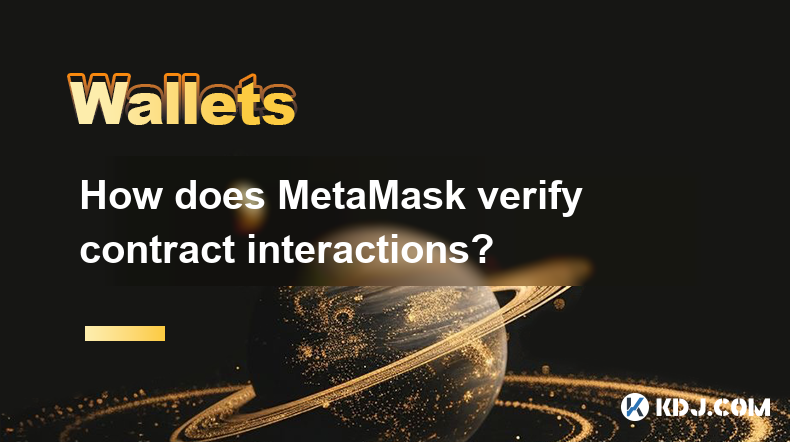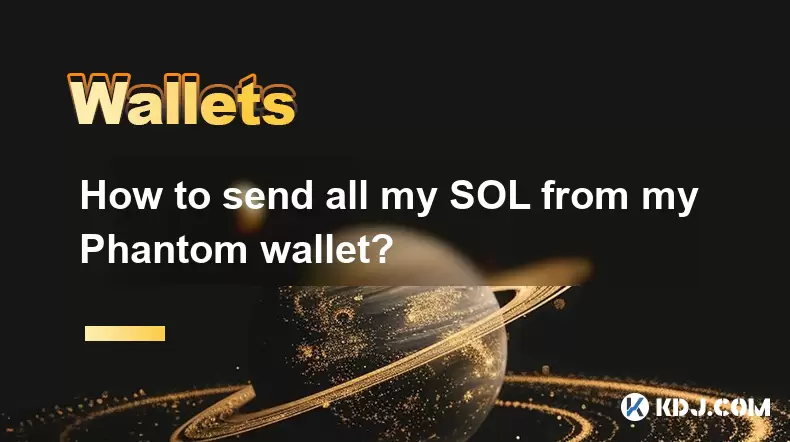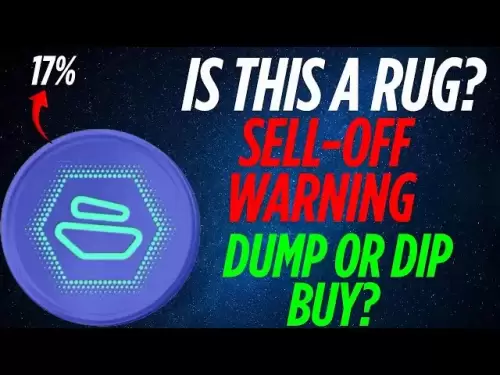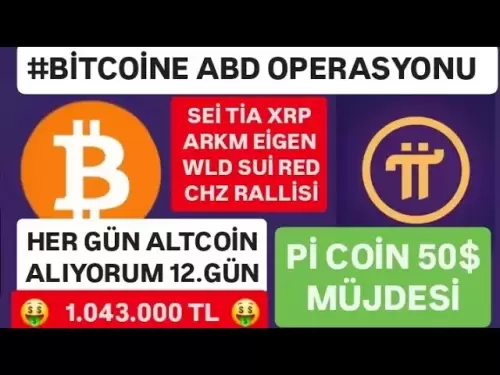-
 Bitcoin
Bitcoin $108,708.8110
0.60% -
 Ethereum
Ethereum $2,561.6057
1.91% -
 Tether USDt
Tether USDt $1.0001
-0.03% -
 XRP
XRP $2.2795
0.57% -
 BNB
BNB $662.2393
1.00% -
 Solana
Solana $153.1346
3.74% -
 USDC
USDC $1.0000
0.00% -
 TRON
TRON $0.2877
0.97% -
 Dogecoin
Dogecoin $0.1710
3.93% -
 Cardano
Cardano $0.5871
1.61% -
 Hyperliquid
Hyperliquid $39.6663
1.68% -
 Sui
Sui $2.9032
0.79% -
 Bitcoin Cash
Bitcoin Cash $496.1879
1.71% -
 Chainlink
Chainlink $13.5807
3.01% -
 UNUS SED LEO
UNUS SED LEO $9.0777
0.61% -
 Stellar
Stellar $0.2514
4.51% -
 Avalanche
Avalanche $18.1761
1.86% -
 Shiba Inu
Shiba Inu $0.0...01173
1.72% -
 Toncoin
Toncoin $2.8010
-4.23% -
 Hedera
Hedera $0.1594
3.21% -
 Litecoin
Litecoin $87.0257
-0.53% -
 Monero
Monero $319.1217
1.79% -
 Polkadot
Polkadot $3.3853
0.68% -
 Dai
Dai $0.9999
-0.01% -
 Ethena USDe
Ethena USDe $1.0003
0.02% -
 Bitget Token
Bitget Token $4.3420
-0.97% -
 Uniswap
Uniswap $7.3772
1.39% -
 Aave
Aave $286.6277
5.61% -
 Pepe
Pepe $0.0...09994
2.33% -
 Pi
Pi $0.4589
1.76%
How does MetaMask verify contract interactions?
MetaMask facilitates smart contract interaction but doesn't verify their safety; users must independently check contract code on explorers like Etherscan, review audits, and assess project reputation before interacting to avoid potential risks.
Mar 23, 2025 at 06:28 pm

Key Points:
- MetaMask doesn't directly verify smart contracts; it relies on the Ethereum network and user awareness.
- Verification involves checking contract code on blockchain explorers.
- Users must independently assess contract risks; MetaMask provides no guarantee of safety.
- Understanding contract code and auditing reports is crucial for secure interaction.
- MetaMask's role is primarily facilitating interaction, not validating contract integrity.
How Does MetaMask Verify Contract Interactions?
MetaMask, a popular Ethereum wallet, acts as an interface for interacting with decentralized applications (dApps) and smart contracts. However, it's crucial to understand that MetaMask itself doesn't actively verify the legitimacy or security of these contracts. Its function is to securely connect users to the Ethereum blockchain, allowing them to send transactions and interact with smart contracts deployed on it. The responsibility for verifying the integrity and safety of a contract lies solely with the user.
Understanding the Limitations of MetaMask's Role
MetaMask's primary role is to facilitate the execution of transactions. It presents users with a user-friendly interface to interact with smart contracts. However, it doesn't perform any independent code analysis or security audits of these contracts. Before interacting with any smart contract, users should independently verify its authenticity and security. Relying solely on MetaMask for contract verification is a significant security risk.
The Importance of Independent Verification
Verifying a smart contract involves several steps that go beyond the capabilities of MetaMask. The process requires examining the contract's source code, checking its deployment address on a blockchain explorer, and potentially reviewing any available security audits. Blockchain explorers like Etherscan or BscScan provide tools to view contract code, transaction history, and other relevant information.
How to Verify a Smart Contract Before Interaction
- Check the Contract Address: Confirm the contract address you're interacting with matches the one officially published by the project. Discrepancies could indicate a fraudulent clone.
- Examine the Contract Code: Access the contract code on a blockchain explorer and carefully review it. While understanding Solidity (the most common smart contract language) is ideal, even a cursory inspection can sometimes reveal suspicious patterns.
- Look for Security Audits: Reputable projects often commission independent security audits of their contracts. The presence of a publicly available audit report, from a trusted security firm, significantly increases confidence in the contract's security.
- Assess the Project's Reputation: Research the project team, their website, and community presence. Look for signs of legitimacy, transparency, and community engagement. A well-established project with a strong community is generally less likely to be malicious.
- Review Community Feedback: Check online forums and social media to see if other users have reported any issues or concerns about the contract.
The Role of Blockchain Explorers in Verification
Blockchain explorers are essential tools for verifying smart contract interactions. These platforms provide a public record of all transactions on the blockchain, including smart contract deployments and interactions. By searching for a contract's address on an explorer, you can view its source code (if it's been verified), transaction history, and other crucial details. This information allows you to independently assess the contract's legitimacy.
Why MetaMask Doesn't and Cannot Verify Contracts
MetaMask's primary function is secure wallet management and transaction signing. Adding a comprehensive smart contract verification system would significantly increase its complexity, potentially compromising its speed and user-friendliness. Furthermore, such a system would be incredibly difficult to create, as it would need to account for the vast range of smart contract designs and potential vulnerabilities. The responsibility for verifying smart contracts remains with the user.
The Risks of Unverified Contract Interactions
Interacting with unverified smart contracts carries significant risks. Malicious contracts can drain your funds, steal your data, or perform other harmful actions. Always exercise caution and thoroughly verify any contract before interacting with it. The absence of verification should be considered a major red flag.
The Importance of User Education and Due Diligence
Ultimately, the security of your interactions with smart contracts depends on your own due diligence. MetaMask provides a secure environment for transactions, but it doesn't guarantee the safety of the contracts you interact with. Understanding the risks involved and taking the necessary steps to verify contracts is essential for protecting your funds and personal information. Educate yourself on smart contract security best practices and stay updated on potential threats.
Frequently Asked Questions
Q: Can MetaMask detect malicious smart contracts?
A: No, MetaMask does not have the capability to detect malicious smart contracts. It simply facilitates the interaction; it doesn't analyze the contract's code for vulnerabilities or malicious intent.
Q: How can I verify if a contract is safe to use?
A: You need to independently verify the contract by checking its code on a blockchain explorer, looking for security audits, and researching the project's reputation and community feedback.
Q: Is it safe to interact with any contract listed on a popular decentralized exchange (DEX)?
A: No, even contracts listed on popular DEXs should be independently verified. Listing on a DEX doesn't guarantee the contract's security or legitimacy. Always perform your own due diligence before interacting.
Q: What happens if I interact with a malicious contract?
A: The consequences can vary greatly depending on the nature of the malicious contract. You could lose funds, have your data stolen, or experience other negative consequences.
Q: Does MetaMask offer any tools to help with contract verification?
A: No, MetaMask does not offer any built-in tools for verifying smart contracts. Users must rely on external resources such as blockchain explorers and security audit reports.
Disclaimer:info@kdj.com
The information provided is not trading advice. kdj.com does not assume any responsibility for any investments made based on the information provided in this article. Cryptocurrencies are highly volatile and it is highly recommended that you invest with caution after thorough research!
If you believe that the content used on this website infringes your copyright, please contact us immediately (info@kdj.com) and we will delete it promptly.
- E-Load Super Blast: Sri Lanka's Prize Bonanza!
- 2025-07-08 02:30:13
- Crypto VC, DeFi Liquidity, and Kuru Labs: What's the Buzz?
- 2025-07-08 02:50:12
- Bitcoin Value, Strategy, and Tax Hit: Decoding MicroStrategy's Q2 2025 Triumph
- 2025-07-08 02:30:13
- Ozak AI Presale: The AI Token Race to $1 and Beyond
- 2025-07-08 00:30:13
- Solana, Memecoins, and BONKbot: Riding the Wave of Telegram Trading
- 2025-07-08 01:10:13
- Bitcoin Miners, AI Wars, and the US Learning Curve: A New York State of Mind
- 2025-07-08 00:30:13
Related knowledge

How to cancel a pending transaction in Phantom wallet?
Jul 03,2025 at 07:21pm
Understanding Pending Transactions in Phantom WalletA pending transaction in the Phantom wallet occurs when a user initiates a transfer or interaction with the Solana blockchain, but it hasn't yet been confirmed by the network. This can happen due to various reasons such as low transaction fees, network congestion, or incorrect gas settings. It's import...

How to see the estimated value of my tokens in Phantom wallet?
Jul 04,2025 at 12:21am
What is Phantom Wallet?Phantom wallet is one of the most popular cryptocurrency wallets designed for the Solana blockchain. It allows users to store, send, receive, and manage various tokens built on Solana, including SPL tokens and NFTs. The wallet offers a user-friendly interface, making it accessible for both beginners and advanced users in the crypt...

How to lock my Phantom wallet extension?
Jul 03,2025 at 11:14am
What Is the Phantom Wallet and Why Lock It?The Phantom wallet is a popular non-custodial cryptocurrency wallet designed for interacting with the Solana blockchain. Supporting both browser extensions and mobile apps, Phantom allows users to store, send, receive, and stake SOL tokens, as well as interact with decentralized applications (dApps). Securing y...

Does Phantom wallet offer two-factor authentication (2FA)?
Jul 03,2025 at 09:00am
Understanding Phantom Wallet and Its Security FeaturesPhantom wallet is a widely used non-custodial cryptocurrency wallet that supports the Solana blockchain. It allows users to store, send, receive, and interact with decentralized applications (dApps) seamlessly. As security is a top priority for any crypto wallet user, security features like two-facto...

How to send all my SOL from my Phantom wallet?
Jul 06,2025 at 10:00am
Preparing to Send SOL from Your Phantom WalletBefore initiating any transaction, it is crucial to ensure that your Phantom wallet is fully set up and connected to the correct network. Phantom supports multiple networks, but for sending SOL, you must be on the Solana blockchain. Confirm this by checking the network indicator in the top-right corner of th...

What is "rent" on Solana and how does it affect my Phantom wallet?
Jul 02,2025 at 08:35pm
Understanding 'Rent' on SolanaIn the context of Solana, the term 'rent' refers to a storage fee that users pay for maintaining data on the blockchain. Unlike Ethereum, where storage costs are paid once via gas fees during contract deployment, Solana implements a recurring cost model to ensure efficient usage of network resources. This means that any acc...

How to cancel a pending transaction in Phantom wallet?
Jul 03,2025 at 07:21pm
Understanding Pending Transactions in Phantom WalletA pending transaction in the Phantom wallet occurs when a user initiates a transfer or interaction with the Solana blockchain, but it hasn't yet been confirmed by the network. This can happen due to various reasons such as low transaction fees, network congestion, or incorrect gas settings. It's import...

How to see the estimated value of my tokens in Phantom wallet?
Jul 04,2025 at 12:21am
What is Phantom Wallet?Phantom wallet is one of the most popular cryptocurrency wallets designed for the Solana blockchain. It allows users to store, send, receive, and manage various tokens built on Solana, including SPL tokens and NFTs. The wallet offers a user-friendly interface, making it accessible for both beginners and advanced users in the crypt...

How to lock my Phantom wallet extension?
Jul 03,2025 at 11:14am
What Is the Phantom Wallet and Why Lock It?The Phantom wallet is a popular non-custodial cryptocurrency wallet designed for interacting with the Solana blockchain. Supporting both browser extensions and mobile apps, Phantom allows users to store, send, receive, and stake SOL tokens, as well as interact with decentralized applications (dApps). Securing y...

Does Phantom wallet offer two-factor authentication (2FA)?
Jul 03,2025 at 09:00am
Understanding Phantom Wallet and Its Security FeaturesPhantom wallet is a widely used non-custodial cryptocurrency wallet that supports the Solana blockchain. It allows users to store, send, receive, and interact with decentralized applications (dApps) seamlessly. As security is a top priority for any crypto wallet user, security features like two-facto...

How to send all my SOL from my Phantom wallet?
Jul 06,2025 at 10:00am
Preparing to Send SOL from Your Phantom WalletBefore initiating any transaction, it is crucial to ensure that your Phantom wallet is fully set up and connected to the correct network. Phantom supports multiple networks, but for sending SOL, you must be on the Solana blockchain. Confirm this by checking the network indicator in the top-right corner of th...

What is "rent" on Solana and how does it affect my Phantom wallet?
Jul 02,2025 at 08:35pm
Understanding 'Rent' on SolanaIn the context of Solana, the term 'rent' refers to a storage fee that users pay for maintaining data on the blockchain. Unlike Ethereum, where storage costs are paid once via gas fees during contract deployment, Solana implements a recurring cost model to ensure efficient usage of network resources. This means that any acc...
See all articles

























































































